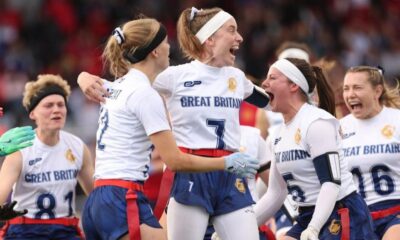LAST UPDATE
|
5 hrs ago
JOHNATHAN MCKINSTRY IS a tired but happy man when he takes a call from The 42 on a September Thursday evening.
The Northern Irishman has just arrived home to his base in Spain after making a surprise trip to Taiwan to visit his wife, who is studying for a Masters there.
The visit followed a busy international window, where McKinstry, from Lisburn, led the Gambian national team to back-to-back World Cup Qualifying victories over Kenya and Burundi.
The results mean Gambia jump eight places in the Fifa world rankings, from 125th to 115th. Of the 210 ranked international sides, only Slovakia have enjoyed a bigger climb.
“We’re really pleased, not just with this boost, but also back in June, we made a good jump after those friendly games as well. We’ve got to keep going because if you have a bad window, all of a sudden you drop down eight or ten places. It’s like an elastic band that can snap back on you very quickly,” McKinstry says.
“Since June, we’ve known that we’re not going to the World Cup. That’s been clear for a little while now, so it’s really important for us to improve our ranking and our seeding as much as possible before next summer, which is when the next African Cup of Nations qualification draw will be made.”
Just before McKinstry became Gambian manager in 2024, the nation was in the fourth and bottom pot of teams in the draw for the AFCON qualifiers. The Northern Irishman tells The 42 that his side are in line to be in the third pot for next year’s qualification stage, with a spot in the second pot even on the cards if results keep going their way.
Aged just 40, you might McKinstry’s role as Gambian boss to be a debut foray into the world of management. Yet the West African country marks the 11th location in the young coach’s globetrotting adventure to date.
First earning his stripes in Northern Ireland, England, USA and Ghana, McKinstry moved into the professional game in 2013 when he was appointed as Sierra Leone boss, making him the then-youngest international manager in the world at 27.
“I don’t think there was any sense of pushing it further down the line,” he says.
“Everyone has their own sort of ideas of what they want out of a career, in football or otherwise. From a young age, I decided professional coaching was the pathway that I wanted to pursue.
“I probably didn’t expect it to happen until I was in my 30s. I set myself a soft ten-year target after leaving university at 22, of wanting to work in the professional game within ten years. Obviously, only five years later, I was presented with the opportunity.
“A lot of people advised me against it, but I said, ‘Is there going to be another chance? Is the door going to open for me again?’ You just never know, so I decided to go for it.
“I can only imagine what the players were thinking when they saw the news that a 27-year-old coach with no professional playing background had been appointed as their head coach,” McKinstry laughs.
“But ultimately, they had a pride of representing their country, so they were going to come and do their best, regardless of who the coach was.
“We knew we had to nail that first coaching session, and I think we did.
“In the first week, there were a few questions coming back from the senior players. You know, ‘What about if we do this, Coach, what about if we do that?’ And ultimately, we didn’t take offence to that.
“I said, ‘Okay, let me explain in more detail why we want to do things how we are, and if you still have questions, we can discuss them. But after we explained why we were changing things and what we hoped to achieve, I think the players went away from those meetings confident in what we were doing.”
Very few are working in professional management in their 20s, but none, except McKinstry, have done so while in a country being overwhelmed by Ebola.
The outbreak directly resulted in nearly 4,000 deaths in Sierra Leone between 2014 and 2016.
“When you have something like this going on and devastating so many people’s lives, in a way, football became a light for people, maybe something to focus on in such bad times,” McKinstry says.
“If we were able to go out and put on a performance, it didn’t solve anything in terms of the epidemic that was happening in West Africa at the time, but maybe it gave people a little bit of joy or a moment of respite from what was otherwise a really difficult period of local and global history.
“As football players and coaches in a group, we just sort of said, ‘Look, even though it’s the smallest of small things that we’re giving back to the people of Sierra Leone, let’s try and give them that, even if it’s just a moment, evening or an afternoon where their mind is taken away from the trauma that was going on.’”
In the decade between leaving the Sierra Leone job and taking the Gambia role in 2024, McKinstry has carved out a remarkable career on the road.
In 2016, he led Rwanda to the knock-out stages of a major competition for the first time in their history, before taking club management jobs in Lithuania and Bangladesh.
By 2019, he had returned to the international game with Uganda, where he claimed his first managerial silverware, winning the CECAFA Cup.
McKinstry’s final role before taking the Gambia job saw him spend two years as manager of Kenya’s most successful club side, Gor Mahia FC.
There, McKinstry inherited a side in turmoil. A FIFA transfer ban meant he only had a lean squad of players at his disposal. Despite this, the Lisburn man managed to guide the side to the Kenyan Premier League title, a feat which he repeated the following season.
“It was very much a case of ‘Well, we can’t sign anybody,’ but we had these young kids. The average age of that squad in the first season was around 22. In our starting lineup, we had four or five players who’d never played senior football before or had played less than five games at senior level.
“It was like my days as an academy coach. There was no distraction of ‘Who else could we play in this position?’ because there were no options. You had to work with the player in front of you and make him the best player he could be.
“We won back-to-back titles in Kenya, but that first one with that group of young players under the transfer ban with zero expectations on them was special.
“Even though it was a big club with a big history, if we’d finished sixth or seventh that season, I don’t think people would have thought it was strange given the situation.
“Winning it on the last day of the season with that group of kids will be difficult to beat, even if I’m hopefully involved in this game until I’m an old man and the game retires me in my 70s.”
Now back on the international circuit, McKinstry does not have many players who play their club football on home soil in contention for selection, as the Gambian league is an amateur competition. However, many internationals do make their name there, such as Brighton star Yankuba Minteh who broke onto the scene as a teenager before attracting the attention of European scouts.
“Almost none of the Gambian squads have players playing in the Gambian League, simply because we have so much quality in Europe. But the nice thing for us is that when we name a 25-man squad, usually 21 or 22 of that squad are born and bred in Gambia.
“We have diaspora players born in Sweden, Germany and England, but we don’t have lots. It’s unique, given that Gambia is a country of a little under 2.5 million people, that we are able to produce so many players domestically that get exported to elite-level environments around Europe.
“I think a lot of African nations look on with envy at how many players we’re developing per head of the population,” McKinstry says.
As a manager who has to contend with the challenges of having so many players playing in different countries across Europe, The 42 asks McKinstry if he can sympathise with Ireland boss Heimir Hallgrímsson, who has faced backlash in the past for preferring the use of football analysis site Wyscout rather than in-person scouting.
“I wouldn’t be too critical of any international coach doing a lot of their work through the analysis platforms because the very nature of the job is that 90% of it has to be done there because you simply can’t replicate yourself 50 times to be at 50 different games.
“I go to so many matches. I’ve got close to 250 players playing in Europe. But I can only be in one place on a Saturday afternoon.
“How often do I go to matches, for example, to see the Derby County captain Ebou Adams, where he is the only Gambian player I get to see? At that exact same time, on that same day, I’ve got another 100 players playing around Europe,” McKinstry smiles.
“Going to games in person is sometimes about more than just watching the game. I try to set up my scouting trips so that I engage with the clubs a little bit. Sometimes that’s difficult to do, because you don’t want to sort of overstep, but for example, I was in Denmark and Sweden last month for ten days, because we’ve got a lot of players there.
“I was also able to spend time at their clubs on non-match days and have good conversations with the head coaches and sporting directors to talk about our Gambian players who are there.
“Building those relationships with clubs is very important, but the 90 minutes of football is very valuable as well. You may see a player playing in a slightly different role for their club team than they do in your system. It’s interesting to watch that from a big picture view, tactically, up in the stand to see how things are different.
“You don’t really get that on WyScout.”
McKinstry might have made his name in far-off nations, but his passion for Irish football remains strong.
Growing up just outside Belfast, McKinstry spent his childhood on the terraces following his local side, Lisburn Distillery, to cup finals and on European adventures.
“I’ve always had a soft spot and a great gratitude for club football in Ireland,” he says.
“If you’re a passionate Arsenal, Man United, Celtic or Rangers fan, obviously, there is a connection to the club, but generally, it’s not the same. Having that first-person, tangible connection to football is such a wonderful thing. It’s great that in Ireland, both north and south, clubs are starting to harness that more and more.
“It’s wonderful that many of the Irish clubs are doing well in European competition. Obviously, last year there were clubs from the north and south getting into the League Phase, and this year there are two from the League of Ireland.”
As someone with a passion for club football on both sides of the border, it’s no surprise that the two sets of encounters between Shelbourne and Linfield last summer caught the Gambian gaffer’s eye.
“Those rivalries are great, two big historic clubs in their own right. It would have been great had they avoided each other and both found their way into the European group stages, because that would have had an impact on both leagues,” McKinstry says.
“With Shelbourne and Shamrock Rovers having a bit more money in the bank now, they’re going to spend it, more often than not, on players from other Irish clubs. Therefore, there is a trickle-down effect of that money.
“In the short term, it means Shels or Rovers are going to have more of a chance to win championships, but in the medium term, many clubs in different communities around the country will benefit from it too.”
In the first set of games, particularly, many noted that Shelbourne’s dominance was a result of the League of Ireland’s summer schedule, while the Northern Irish side were only returning from a summer break.
“Obviously, the LOI’s not the only European league with that schedule. The likes of Norway, Sweden and Iceland do it too, McKinstry says.
“We’ve got a couple of Gambian players who play in Latvia. Last year, the Latvian club FK RFS did really well in the Conference League. They beat Ajax, a crazy result! But the problem then was that the backend of the group stages was in the Latvian off-season.
“The summer season helped them get into the competition, but then, when they came to the last three or four games of the league phase, it was at a time when the players should have been on holiday. It has negative consequences then, because players aren’t playing regular competitive football.
“That might be something that in years to come will negatively affect League of Ireland teams. Because, touch wood, more teams are going to be involved in the league phases of the various European competitions. But you’re going to get to the point that you say, ‘Hey, maybe we can get to the knockout stage’. But those last two or three league phase games are being played when the last League of Ireland game was six weeks ago.
“So, down the line, the success of summer football will also lead to challenges.”














